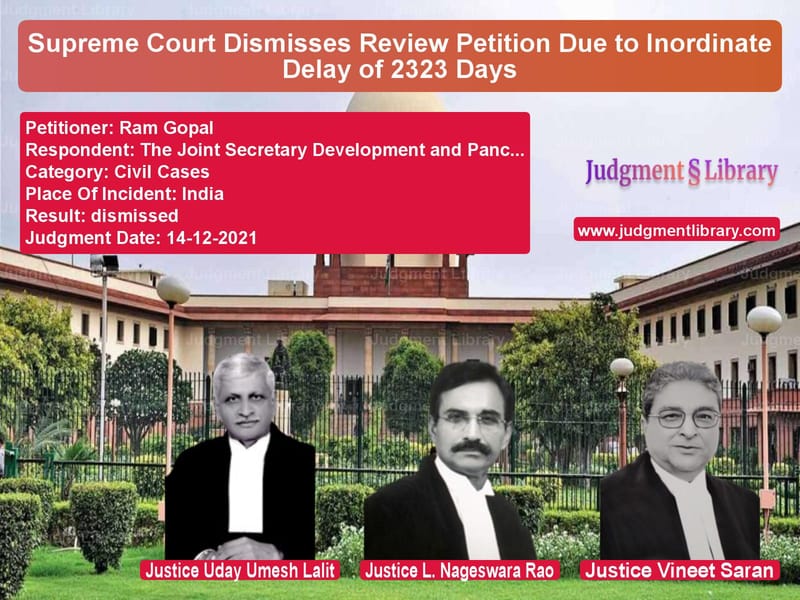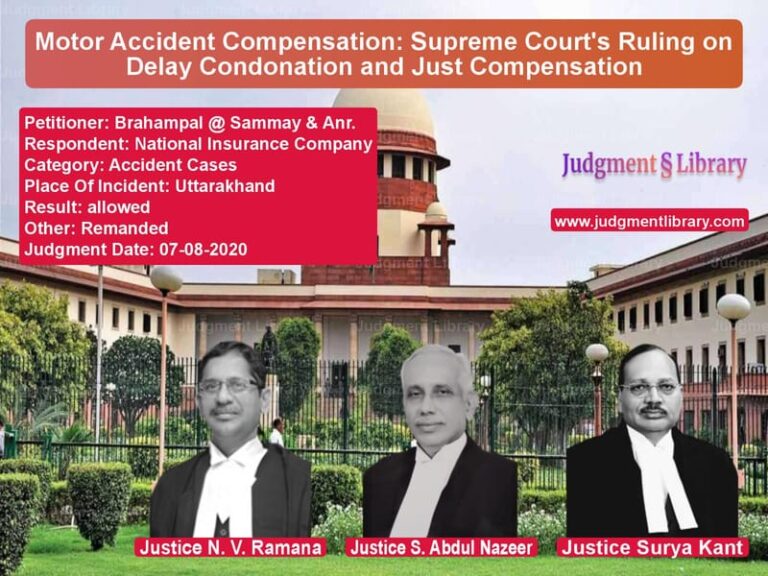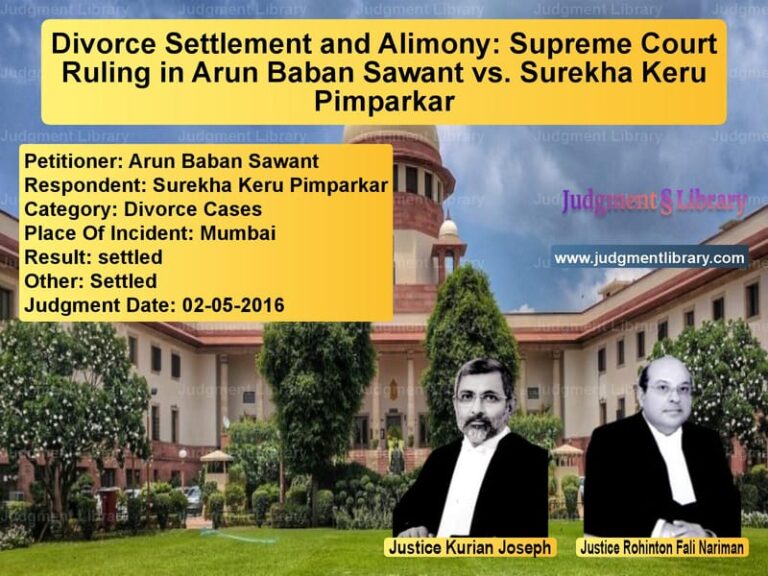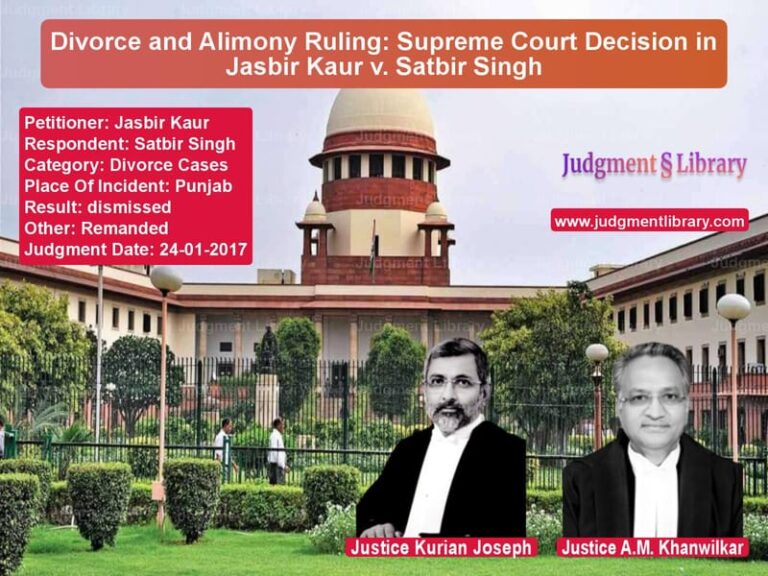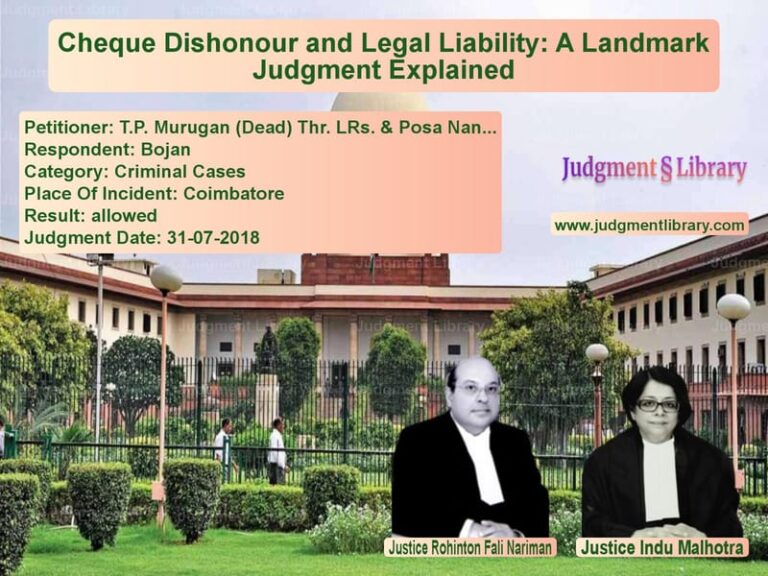Supreme Court Dismisses Review Petition Due to Inordinate Delay of 2323 Days
The Supreme Court of India, in a recent ruling, dismissed a review petition filed by Ram Gopal against the Joint Secretary of the Development and Panchayat Department and another respondent. The petition, which sought a review of a prior judgment in Special Leave Petition (Civil) No. 17673 of 2014, was dismissed on the grounds of excessive delay. The Court found that the petitioner had failed to provide a satisfactory explanation for the delay of 2323 days in filing the review petition, thereby refusing to condone the delay.
Background of the Case
The case originated from a dispute involving the petitioner, Ram Gopal, who had previously sought relief from the Supreme Court in 2014. After his special leave petition was dismissed, he filed a review petition seeking reconsideration of the decision. However, this review petition was filed more than six years (2323 days) after the original judgment, prompting the Supreme Court to consider whether such a delay could be condoned.
Read also: https://judgmentlibrary.com/supreme-court-upholds-kartas-right-to-sell-joint-hindu-family-property/
The petitioner argued that there were justifiable reasons for the delay and sought leniency from the Court. However, the respondents contended that the delay was excessive and demonstrated a lack of diligence on the part of the petitioner.
Arguments by the Petitioner
Ram Gopal, through his legal counsel, presented the following arguments:
- The delay was unintentional and occurred due to unavoidable circumstances.
- There were administrative and procedural difficulties that prevented the timely filing of the review petition.
- The petitioner had a strong case on merits, and dismissing the review petition solely on grounds of delay would result in grave injustice.
- The Supreme Court should take a liberal approach in condoning the delay to ensure substantive justice.
Arguments by the Respondents
The respondents opposed the petition, making the following counterarguments:
- A delay of 2323 days was inordinate and showed clear negligence on the part of the petitioner.
- The petitioner failed to provide any reasonable or satisfactory explanation for such an extraordinary delay.
- The legal principle of finality in litigation must be upheld, and permitting review petitions after such a long delay would set a dangerous precedent.
- The Supreme Court has consistently held that condonation of delay should be granted only in rare and exceptional cases.
Supreme Court’s Ruling
The Supreme Court, after reviewing the case, refused to condone the delay and dismissed the review petition. The Court made the following key observations:
- The explanation provided by the petitioner for the delay was inadequate and unconvincing.
- Litigation must come to an end, and allowing review petitions after such an excessive delay would disrupt judicial finality.
- The petitioner failed to demonstrate any exceptional circumstances that would justify the condonation of delay.
- The doctrine of laches applied in this case, as the petitioner did not act with reasonable diligence in pursuing his legal remedies.
The Court held:
“There is a delay of 2323 days in preferring the instant review petition. We have gone through the contents of the application seeking condonation of delay. The explanation offered is far from being satisfactory. The application for condonation of delay is, therefore, rejected.”
Key Legal Precedents Considered
- Collector, Land Acquisition v. Mst. Katiji – Established that while courts should adopt a liberal approach in condoning delay, excessive delay must be satisfactorily explained.
- State of Madhya Pradesh v. Bherulal – Reaffirmed that inordinate and unexplained delays cannot be condoned merely on sympathetic grounds.
- Office of the Chief Post Master General v. Living Media India Ltd. – Emphasized that government and private litigants alike must demonstrate diligence in filing appeals and review petitions.
Implications of the Judgment
The Supreme Court’s ruling reinforces several key legal principles:
- Judicial Finality: It upholds the doctrine that litigation must come to an end and that review petitions should not be used as a means to prolong disputes indefinitely.
- Strict Adherence to Limitation Periods: The judgment signals that courts will not tolerate excessive delays unless satisfactorily explained.
- Accountability of Litigants: Both private individuals and government entities must act diligently and pursue legal remedies within the prescribed time limits.
- Exceptions to Delay Condonation: Only in rare cases, where genuine and unavoidable reasons exist, will the Court condone a significant delay.
Final Verdict
The Supreme Court’s decision to dismiss the review petition due to a delay of 2323 days serves as a strong precedent against frivolous and delayed litigation. The ruling ensures that legal processes remain efficient and do not become avenues for endless reconsideration of settled issues.
By refusing to condone the delay, the Court has reaffirmed the importance of adhering to legal timelines and respecting judicial finality. Litigants are expected to act with due diligence and not rely on leniency to revive long-dormant cases.
Petitioner Name: Ram Gopal.Respondent Name: The Joint Secretary Development and Panchayat Department & Anr..Judgment By: Justice Uday Umesh Lalit, Justice L. Nageswara Rao, Justice Vineet Saran.Place Of Incident: India.Judgment Date: 14-12-2021.
Don’t miss out on the full details! Download the complete judgment in PDF format below and gain valuable insights instantly!
Download Judgment: ram-gopal-vs-the-joint-secretary-supreme-court-of-india-judgment-dated-14-12-2021.pdf
Directly Download Judgment: Directly download this Judgment
See all petitions in Legal Malpractice
See all petitions in Contempt Of Court cases
See all petitions in Judgment by Uday Umesh Lalit
See all petitions in Judgment by L. Nageswara Rao
See all petitions in Judgment by Vineet Saran
See all petitions in dismissed
See all petitions in supreme court of India judgments December 2021
See all petitions in 2021 judgments
See all posts in Civil Cases Category
See all allowed petitions in Civil Cases Category
See all Dismissed petitions in Civil Cases Category
See all partially allowed petitions in Civil Cases Category

